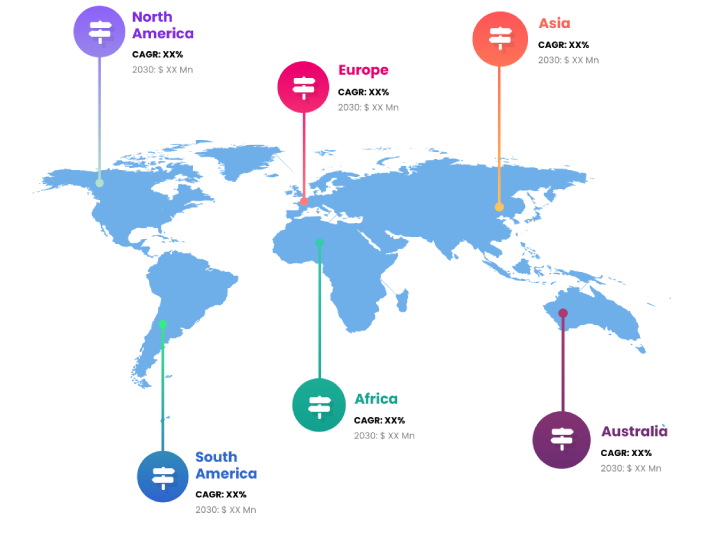
A set of protocols and enhanced messaging standards called rich communication services (RCS) are intended to improve the usefulness of the messaging software that comes pre-installed in mobile devices. RCS is anticipated to entirely replace SMS and MMS communications thanks to its sophisticated capabilities including group chats, media sharing, video calling, and location sharing. As a result, it is projected that a key element driving market growth over the projection period will be the growing adoption of mobile service subscribers.
A2P and P2P messaging domains now provide a higher level of interactivity thanks to RCS. When engaging with customers, it helps businesses to visually mark their messaging, preserving their corporate branding and identity. RCS marketing would allow firms to send messages that keep the look and feel of their applications, websites, and other digital offerings by enabling brands to give some level of personalization, such as the ability to utilize unique colors, logos, and company brand names as sender IDs. Companies have benefited from end users' attention and increased involvement thanks to the RCS platform. RCS will likely change digital marketing and advertising tactics. Traditional SMS is no longer the primary medium of communication for brands and organizations. These firms require more interactive methods of client communication. RCS is playing a bigger and bigger part in marketing and advertising campaigns to deliver more genuine and individualized engagement chances with the fast expanding hyper-connected customer base.
RCS is gaining popularity as a replacement for the current SMS protocol because it makes it possible to produce messages that are interesting, immersive, and engaging. Despite its advantages, RCS cannot provide end-to-end communication encryption, making it challenging to persuade customers to utilize it.Since RCS providers can see what customers are saying, sensitive information cannot be transferred using RCS. RCS is therefore not considered to be an end-to-end encrypted messaging channel, which puts it at a disadvantage when compared to rival chat applications like iMessage, WhatsApp, and Signal that have robust message encryption features.
The large enterprises segment dominated the market for rich communication services globally in 2019, and it is anticipated that this trend will continue throughout the forecast period as the implementation of rich communication services is further assisting large enterprises' IT & telecommunication teams in changing the way of communicating with messaging that can deliver rich content. The traditional method of messaging does not work effectively in large corporations or college settings since the messaging and communicating needs are changing. As a result, the adoption of rich communication services is expanding quickly among large businesses, offering a flexible and dynamic approach.
Manufacturers of mobile devices, telecom providers, and independent application developers have all contributed equally to the market for rich communication services. Because of the backing of all the concerned parties, interoperability is a key factor in the adoption of rich communication services. The GSM Association (GSMA) has published the universal profile definition to help all operators across the world adopt rich communication services. By enabling operator service interoperability, the installation of universal profile helps to provide a consistent messaging experience. Rich communication services would therefore have comparable fundamental features when implemented on any mobile phone across any operator network, resulting in uniformity and an improved user experience.
A developing trend is the combination of RCS platforms and AI technologies like chatbots and virtual assistants. Businesses may automate client interactions, offer quick assistance, and provide individualized recommendations with the help of chatbots powered by AI. The total client experience is improved by this integration, which also increases operational effectiveness. RCS communications is increasingly including rich media content like films, photos, and interactive components. A more interesting and immersive communication experience is made possible by the capacity to transmit and receive rich media communications in real-time. Businesses now have more options to promote their goods and services through aesthetically appealing material thanks to this trend.
The COVID-19 epidemic has significantly altered how individuals live their daily lives, go about their jobs, and interact with their surroundings. Pre-COVID-19 estimations are expected to be much lower than the present forecast for 2027. By the end of 2020, the market is anticipated to stabilize; however, in the years to follow, it is anticipated to expand significantly at a higher CAGR due to working from home (WFH), social isolation, and company digital transformation. These elements have emerged as crucial elements in the development of company messaging as the optimum medium for customer communication. However, the demand for RCS solutions drastically reduced during lockdown, showing that businesses had little to no interest in using these channels at that time. Additionally, in a post-lockdown scenario, SMS messaging is predicted to become less popular as consumers want richer communications options, with RCS finally being the dominant channel due to its size.
Report Coverage
Global Rich Communication Services research report categorizes the market for global based on various segments and regions, forecasts revenue growth, and analyzes trends in each submarket. Global Rich Communication Services report analyses the key growth drivers, opportunities, and challenges influencing the global market. Recent market developments and Rich Communication Services competitive strategies such as expansion, product launch and development, partnership, merger, and acquisition have been included to draw the competitive landscape in the market. The report strategically identifies and profiles the key Rich Communication Services market players and analyses their core competencies in each global market sub-segments.
| REPORT ATTRIBUTES | DETAILS |
|---|---|
| Study Period | 2017-2030 |
| Base Year | 2022 |
| Forecast Period | 2022-2030 |
| Historical Period | 2017-2021 |
| Unit | Value (USD Billion) |
| Key Companies Profiled | AT&T (US), Vodafone (Uk), Deutsche Telekom (Germany), Google (US), Verizon (US), Telefonica (Spain), Orange Business (US), China Mobile (China), KDDI (Japan), Slovak Telekom (Slovakia), Telit (UK), SK Telecom (South Korea), Telstra (Australia), LG U+ (South Korea), Celcom (Malaysia), Freedom Mobile (Canada), Rogers (Canada), T-Mobile (US), O2 (UK), Telia Company (Sweden), Magyar Telekom (Hungary), Claro (Brazil), Swisscom (Switzerland), Reliance Jio (India), HUAWAI TECHNOLOGIES CO. LTD., ZTE CORPORATION., ERICSSION, Huawei Technologies (China), Mavenir Systems (US), NTT DoCoMo (Japan), Samsung (South Korea), TATA Communications (India), Ericsson (Sweden), RIM (Canada), SoftBank (Japan), Telenor (Norway). |
| Segments Covered | • By Product |
| Customization Scope | Free report customization (equivalent to up to 3 analyst working days) with purchase. Addition or alteration to country, regional & segment scope |
Key Points Covered in the Report
- Market Revenue of Rich Communication Services Market from 2021 to 2030.
- Market Forecast for Rich Communication Services Market from 2021 to 2030.
- Regional Market Share and Revenue from 2021 to 2030.
- Country Market share within region from 2021 to 2030.
- Key Type and Application Revenue and forecast.
- Company Market Share Analysis, Rich Communication Services competitive scenario, ranking, and detailed company
profiles. - Market driver, restraints, and detailed COVID-19 impact on Rich Communication Services
Market
Competitive Environment:
The research provides an accurate study of the major organisations and companies operating in the global Rich Communication Services market, along with a comparative evaluation based on their product portfolios, corporate summaries, geographic reach, business plans, Rich Communication Services market shares in specific segments, and SWOT analyses. A detailed analysis of the firms' recent news and developments, such as product development, inventions, joint ventures, partnerships, mergers and acquisitions, strategic alliances, and other activities, is also included in the study. This makes it possible to assess the level of market competition as a whole.
List of Major Market Participants
AT&T (US), Vodafone (Uk), Deutsche Telekom (Germany), Google (US), Verizon (US), Telefonica (Spain), Orange Business (US), China Mobile (China), KDDI (Japan), Slovak Telekom (Slovakia), Telit (UK), SK Telecom (South Korea), Telstra (Australia), LG U+ (South Korea), Celcom (Malaysia), Freedom Mobile (Canada), Rogers (Canada), T-Mobile (US), O2 (UK), Telia Company (Sweden), Magyar Telekom (Hungary), Claro (Brazil), Swisscom (Switzerland), Reliance Jio (India), HUAWAI TECHNOLOGIES CO. LTD., ZTE CORPORATION., ERICSSION, Huawei Technologies (China), Mavenir Systems (US), NTT DoCoMo (Japan), Samsung (South Korea), TATA Communications (India), Ericsson (Sweden), RIM (Canada), SoftBank (Japan), Telenor (Norway).
Primary Target Market
- Market Players of Rich Communication Services
- Investors
- End-users
- Government Authorities
- Consulting And Research Firm
- Venture capitalists
- Third-party knowledge providers
- Value-Added Resellers (VARs)
Market Segment:
This study forecasts global, regional, and country revenue from 2019 to 2030. INFINITIVE DATA EXPERT has segmented the global Rich Communication Services market based on the below-mentioned segments:
Global Rich Communication Services Market, By Enterprise Size
Small & Medium Enterprises
Large Enterprises
Global Rich Communication Services market, By Application
Rich Calls & Messaging
Content Delivery (Content Sharing, File Transfer)
Value Added Services (VAS)
Marketing & Advertising Campaign
Cloud Storage
Global Rich Communication Services Market, By Industry Vertical
Healthcare
Retail & E-commerce
BFSI
IT & Telecom
Travel & Tourism
Others
Global Rich Communication Services market, Regional Analysis
- Europe: Germany, Uk, France, Italy, Spain, Russia, Rest of Europe
- The Asia Pacific: China,Japan,India,South Korea,Australia,Rest of Asia Pacific
- South America: Brazil, Argentina, Rest of South America
- Middle East & Africa: UAE, Saudi Arabia, Qatar, South Africa, Rest of Middle East & Africa
You will get in-depth and extensive rich communication services market market research and competitor analysis for your business to help you develop more profound insights into the rich communication services market Market.
Through INFINITIVE Data Expert is a professional Market Research services, I will identify the rich communication services market market size, demand & opportunities, growth rate, and target audience with a comprehensive analysis of your competitors.



